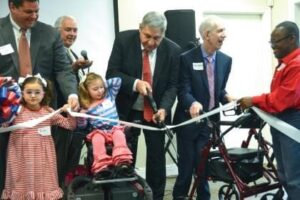United Cerebral Palsy of Greater Birmingham has been serving more than cerebral palsy patients for 70 years, so on February 14, it said “goodbye” to the old and launched a new brand and name, United Ability, to more accurately reflect the variety of disabilities served by the organization.
United Ability reflects the organization’s desire and need to unite everyone in the community, regardless of ability, to live powerful and meaningful lives, says Alison Berman, chief development officer. “There is no change in our mission or our vision,” says Berman. “Maybe a third of the 4,000 or so that are served yearly actually have CP. So this just follows to change the name, and we tried to take away the ‘dis’ that has been a negative, and make it about ‘ability,’ which is a positive.”
Dr. Gary Edwards, CEO, says the name change is more reflective of what the organization does and what it is to the community. “Today, we have grown and are united in purpose, who we want to be. We changed the name to reflect what we already are and have been doing – helping people with disabilities lead more enriched lives.”
Edwards adds that the name change will help the organization to “remain true to our longstanding mission and we convey our work helping people with ALL types of disabilities throughout their lifetimes. This support, from birth throughout life, makes United Ability unique.”
Serving people from newborn to adulthood, United Ability has all the services that UCP historically had – Hand in Hand, the NAEYC-accredited early learning program serving children ages 6 weeks to 5 years with and without disabilities; LINCPoint, the adult day care program serving more than 150 adults with disabilities; a state-of-the-art on-site medical clinic with Dr. Charles Law, chief medical officer, in a partnership with UAB; a supported employment program that helps more than 350 adults with disabilities find and maintain work, and UNITED ABILITY Enterprises and Gone for Good that employs more than 100 adults with disabilities through workshops and their NAID AAA certified document destruction company.
United Ability serves adults and children with disabilities including, but not limited to, intellectual disabilities, traumatic brain injury, developmental disabilities, cerebral palsy, autism, Down syndrome and spina bifida. In addition, it is the largest early intervention provider, serving almost 750 children ages birth to 3 years old in a seven-county area.
United Ability also provides physical therapy, speech therapy, occupational therapy, education and other services. In addition, the organization sees people after accidents, with head injuries, spinal injuries, paralysis and more.
United Ability does all they can on site, Berman says, “but we are advocating everywhere. We don’t want to be the “best kept secret.”
“Millennials have no idea who we are,” Edwards adds, and they hope this name change is just one way to change that. Edwards has led the organization for the past 34 years, being only the third director in the lifetime of the organization. If the name change means growth, Edwards says they are ready to grow. The clinic is poised to expand to reach more of those they serve with a highly credentialed and seasoned staff, Berman adds.
“We want to create a community for those who love us and the parents who need us,” Berman says. “Our new name is dedicated to every individual and family touched by our work. United Ability focuses on the positive: what each individual can accomplish and how their lives are enriched.”
For more information about the United Ability and the name change, visit www.unitedability.org. No referral is required to use its services.
Carol Muse Evans is publisher & editor of Birmingham Parent.





